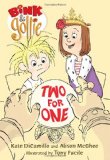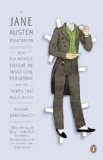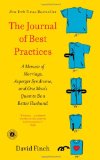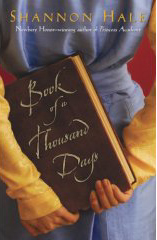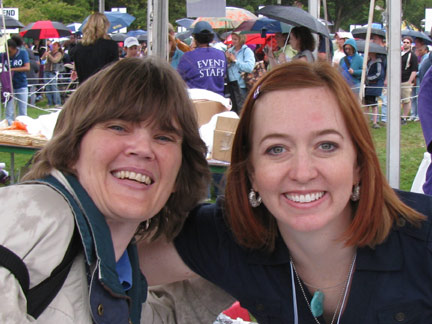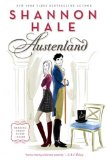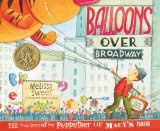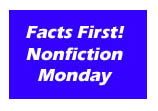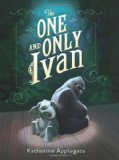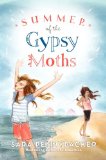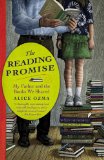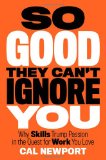 So Good They Can’t Ignore You
So Good They Can’t Ignore You
Why Skills Trump Passion in the Quest for Work You Love
by Cal Newport
Business Plus, New York, 2012. 273 pages.
Starred Review
2012 Sonderbooks Stand-out #2 Other Nonfiction
It only took a few chapters of this book to convince me it would make a good Christmas present for both of my young adult sons (and by that I mean adults who are young, not high school students). So I will wait to post this review until after Christmas. Having just finished the book myself, I keep thinking about the ideas and about how they apply to my own career.
All my life, I believed the key to a happy work like was Finding Your Passion. I read books like Do What You Love, the Money Will Follow, and thought I’d found directions for a happy life. Now, in my second career — or really my first career, since teaching college math was just a job — I think I’m happy because I found a job that fits my passion. So why do Cal Newport’s words ring so true?
His subtitle explains what he’s talking about: Why Skills Trump Passion in the Quest for Work You Love. He begins by saying that advice I’d believed in so long — “Follow your passion.” — is dangerous advice.
So, I thought I was following my passion, but why did I feel a certain criticism for others I saw not working, looking for the perfect job? I do think a certain amount of affinity is needed, but maybe that’s just another word for skills? As an example, after I got my Master’s degree in Math, I taught college Mathematics for ten years.
I love math. I even enjoy grading papers. Getting up in front of a class and teaching it? Not so much. I’m an introvert, and when I eventually began working in a library, I found the one-on-one interaction infinitely more to my liking. Even running library children’s programs feels much more individualized and personal than getting up in front of a college classroom and having to test people on what they get from my teaching.
However, to be fair, Cal Newport doesn’t just go with a simple “Don’t follow your passion.” He looks deeper at what things do go into a fulfilling career. The research shows that three key components of fulfilling work are:
Autonomy: the feeling that you have control over your day, and that your actions are important.
Competence: the feeling that you are good at what you do
Relatedness: the feeling of connection to other people
If “Follow your passion” is dangerous advice, what should you do? He contrasts “the passion mindset” with “the craftsman mindset.” The craftsman mindset is summed up in the Steve Martin quote he used for the title of the book: “Be so good they can’t ignore you.” And that means working hard toward mastery.
The contrast is summed up this way:
Whereas the craftsman mindset focuses on what you can offer the world, the passion mindset focuses instead on what the world can offer you. This mindset is how most people approach their working lives.
There are two reasons why I dislike the passion mindset (that is, two reasons beyond the fact that, as I argued in Rule #1, it’s based on a false premise). First, when you focus only on what your work offers you, it makes you hyperaware of what you don’t like about it, leading to chronic unhappiness. This is especially true for entry-level positions, which, by definition, are not going to be filled with challenging projects and autonomy — these come later. When you enter the working world with the passion mindset, the annoying tasks you’re assigned or the frustrations of corporate bureaucracy can become too much to handle.
Second, and more serious, the deep questions driving the passion mindset — “Who am I?” and “What do I truly love?” — are essentially impossible to confirm. “Is this who I really am?” and “Do I love this?” rarely reduce to clear yes-or-no responses. In other words, the passion mindset is almost guaranteed to keep you perpetually unhappy and confused, which probably explains why Bronson admits, not long into his career-seeker epic What Should I Do With My Life? that “the one feeling everyone in this book has experienced is of missing out on life.”
It fascinated me that Cal Newport brought up Po Bronson’s book. I reviewed What Should I Do With My Life? in 2003, and discussed the ideas at length — what does it mean to find your calling? At the time, it was the review that generated by far the most discussion among those who read it.
Now, I still think there’s something in the idea of finding your calling. But I did like the way Cal Newport made the case that a meaningful mission comes after you’ve built up some career capital. It takes time. It’s not about deciding ahead of time and then pursuing that calling, but more often builds out of achieving mastery and then finding how to make it meaningful.
Cal Newport argues, “you adopt the craftsman mindset first and then the passion follows.”
He presents research and case studies and excellent arguments and then gives us “The Career Capital Theory of Great Work”:
The traits that define great work are rare and valuable.
Supply and demand says that if you want these traits you need rare and valuable skills to offer in return. Think of these rare and valuable skills you can offer as your career capital.
The craftsman mindset, with its relentless focus on becoming “so good they can’t ignore you,” is a strategy well suited for acquiring career capital. This is why it trumps the passion mindset if your goal is to create work you love.
He goes on to talk about how best to do that. He again looks at examples of people with satisfying, meaningful careers. He shows us the importance of deliberate practice in increasing your skills. He makes some interesting claims:
Even with the craftsman mindset, however, becoming “so good they can’t ignore you” is not trivial. To help these efforts I introduced the well-studied concept of deliberate practice, an approach to work where you deliberately stretch your abilities beyond where you’re comfortable and then receive ruthless feedback on your performance. Musicians, athletes, and chess players know all about deliberate practice. Knowledge workers, however, do not. This is great news for knowledge workers: If you can introduce this strategy into your working life you can vault past your peers in your acquisition of career capital.
He goes on to talk about what constitutes a great job. One aspect is control. But there are two Control Traps. The first one is that you need career capital to acquire sustainable control in your job. The second control trap is that by the time you have enough career capital, you’re going to be so valuable to your employer, they will resist your making the change.
He does offer some good tests to navigate those control traps and figure out if you really have the career capital to make a change. The “law of financial viability” is nice and practical: Are people willing to pay for your new pursuit?
And then he talks about building a Mission. Here’s where passion comes in — later in your career. He argues again that you need career capital for this step. And if you want a mission that makes a difference, you should look at the cutting edge of your career field. So when you’re new to the field and lacking in career capital, it’s not yet time to devise a mission.
Once you do get an idea of where you’d like to go, he suggests the strategy of “little bets” — small steps that generate concrete feedback. “Then use this feedback, be it good or bad, to help figure out what to try next. This systematic exploration can help you uncover an exceptional way forward that you might have never otherwise noticed.”
Another strategy he noticed in the people he studied was “the law of remarkability”:
This law says that for a project to transform a mission into a success, it should be remarkable in two ways. First, it must literally compel people to remark about it. Second, it must be launched in a venue conducive to such remarking.
Now, I have some questions about that. What if you aren’t going for “remarkable” success? What if you’re just going for happiness? Looking back at the traits of people happy with their jobs, I’m not sure remarkability is important. But I do like the idea of testing out which way to go — that’s all part of the strategy of building rare and valuable traits, being excellent at what you do.
Now this book, like Po Bronson’s book, didn’t even come close to talking about lifestyle choices like setting aside a career to raise children. But now that my children are grown, I like thinking about and wondering how all the different skills I’ve built in my life can combine into valuable career capital. How can I use deliberate practice and little bets to become a better librarian? And what aspects of my work do I want to deliberately practice? Reviewing? Readers’ advisory? Early literacy? Self-directed learning?
Part of the excellence of this book is that it has things to think about for people at every stage of their careers — for my son who’s just started college, my son looking for a job, for me having found a job I love, and even for someone years into their career thinking about what their mission should be or if they are ready for a change. There’s plenty in this book to get you thinking for a long time to come.
calnewport.com
bizplusbooks.com
Buy from Amazon.com
Find this review on Sonderbooks at: www.sonderbooks.com/Nonfiction/so_good_they_cant_ignore_you.html
Disclosure: I am an Amazon Affiliate, and will earn a small percentage if you order a book on Amazon after clicking through from my site.
Source: This review is based on a library book from the Fairfax County Public Library.
Disclaimer: I am a professional librarian, but I write the posts for my website and blogs entirely on my own time. The views expressed are solely my own, and in no way represent the official views of my employer or of any committee or group of which I am part.
